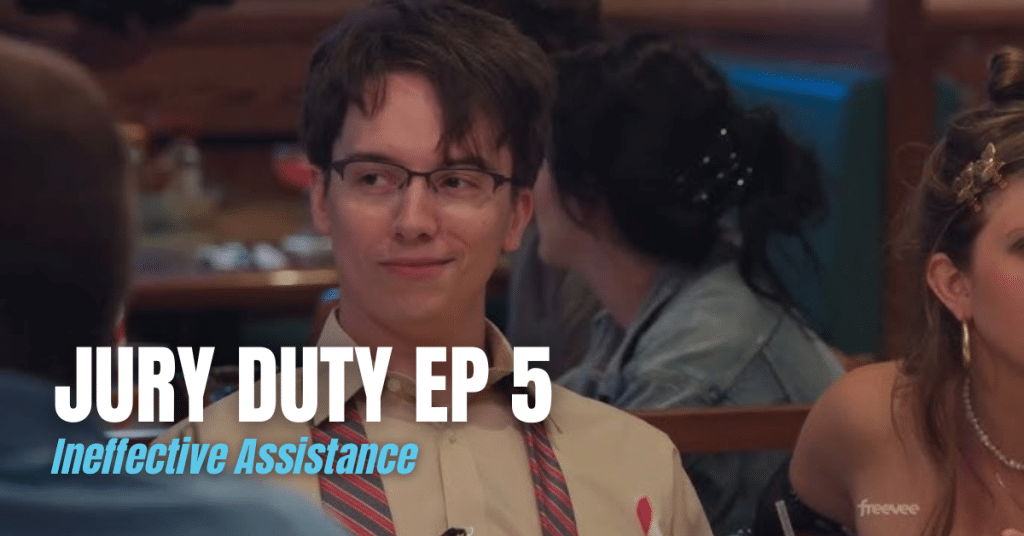During this episode of Jury Duty, we are in the heart of the trial and the defense counsel started to call character witnesses to the stand to testify on the defendant’s character. During the episode we also are introduced to the legal term of ineffective assistance of counsel. There are two themes that stand out in this episode, the first is how important the character witnesses can be to the case and just what is ineffective assistance of counsel and how does that affect the trial. Each of these themes are things that are on display in the real world as well as in the show.
Character Witnesses
The theme of the importance of character witnesses is shown from the beginning of the episode. The defense counsel calls two witnesses to the stand to testify about the defendant’s character, his mother and one of his friends. The friend is initially called to the stand and the defense attorney begins to ask him about how he feels about the defendant. The witness tells the court that he has always found the defendant reliable and has always been there for him in a time of need. The defendant’s friend was trying to paint a positive picture of the defendant for the jury in order to combat what the plaintiff has been saying about him throughout the trial. After the witness is questioned by the defense counsel, the plaintiff’s counsel confronts the witness about a crime that he has committed in the past. The defendant answers honestly that he was convicted of the crime and as a result all of the positive things that he had said about the defendant no longer hold any weight with the jury due to the nature of the crime committed by the witness.
Next, the defendant’s mother is called to testify about her son. The mother’s testimony does not shed a positive light on the defendant; in fact, her statements make the defendant look very bad in the eyes of the jury. The members of the jury commented that even his own mother could not say anything good about the defendant. This is a great example of how important a character witness could be to the entire proceeding. The jury is able to be swayed by character witnesses due to the emotional nature of the testimony that naturally comes with testifying to a person’s character. The negative testimony from the defendant’s mother shows that character witnesses are very important because testimony that places the plaintiff in a bad light can cloud the mind of the jury when it is time for them to deliberate and eventually render a verdict.
After the testimony by the friend and mother, the defense attorney has the defendant take the stand. It is clear that the defendant and the defense counsel are not on the same page while the defendant is on the stand. The attorney seems like he is trying to make the case that the plaintiff was irresponsible for hiring the defendant in the first place, but due to the defendant not knowing that is what his attorney was doing he decides something needs to be done.
Ineffective Assistance of Counsel
The second theme present in the episode shows up when the defendant decided that he did not like the way that his attorney was beginning to present his defense. The defense attorney started to question his client regarding whether or not he felt that it was a responsible decision for the plaintiff to hire him due to his history of less than stellar behavior. It was clear that the defendant did not understand what his attorney was doing, but he got fed up with his character being besmirched in the courtroom. After going through a few questions, the defendant got visibly frustrated and tells the judge that he has done some research on his own and claims that his attorney is exemplifying ineffective assistance of counsel.
This is something that happens in the real world, but not in civil cases like in the show. Ineffective assistance of counsel is something that applies in criminal cases. In the context of a civil case, the comparable doctrine would be legal malpractice. In this case, the defendant ends up firing his attorney and proceeding to represent himself in the remainder of the lawsuit. Generally, clients are able to fire their attorney at any time for a legitimate reason, but it is not common for the client to fire their attorney in the middle of the trial and proceed to represent themselves. The majority of the time, a claim of ineffective assistance of counsel and legal malpractice claims are made at the conclusion of the case if the client feels that they were not properly represented and would have achieved a different outcome if not for their current counsel.


